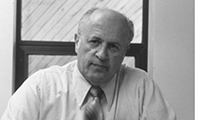 Dr. Barry Herman ‘72 describes himself as a “lost kid” during much of his time at Clark University. The psychology major found himself swept up in the counterculture of the late ‘60s, nearly flunked out, took semesters off and had no clue what he wanted to do with his life.
Dr. Barry Herman ‘72 describes himself as a “lost kid” during much of his time at Clark University. The psychology major found himself swept up in the counterculture of the late ‘60s, nearly flunked out, took semesters off and had no clue what he wanted to do with his life.
But as he entered his fifth year, he got his head together, earned decent grades and decided on his next destination: medical school.
“Even my parents thought I was out of my mind,” Herman recalls. “My father owned a liquor store, and he said if things didn’t work out I could always work at the store.”
Herman approached Clark’s premed advisor, Professor Edward N. Trachtenberg, and told him his story. Trachtenberg listened intently.
“He took me to the student union and bought me a cheeseburger and he said, ‘This is what you have to do to get into med school.’ Never once did he say I couldn’t do it — he simply outlined the path that I would need to take.
“He didn’t just give me a plan,” says the Philadelphia-based physician executive. “He gave me hope.”
Ed Trachtenberg, who passed away on Sept. 23, provided many students direction, advice, and, yes, hope during his nearly 40-year career as a professor of chemistry and prehealth advisor.
“Professor Trachtenberg was passionate about student success,” says Clark University President David Angel. “He worked one-on-one with hundreds of Clark students in the sciences to ensure their successful transition to top tier graduate programs and medical schools.”
From 1958 to 1997 Ed Trachtenberg built a reputation as an exacting teacher in the organic chemistry lab, a dedicated coach who led some of Clark’s most successful men’s tennis teams, and a fierce advocate for his students.
“Professor Ed Trachtenberg was the most brilliant and inspiring lecturer and teacher that I have ever encountered,” says Dr. Stephen Provencher ‘64, a scientific researcher who has developed a software package for the automatic analysis of MRI data. “Outside the classroom and chemistry lab, his enthusiasm as an advisor and his genuine interest in the students was undiminished. It was clear that he really enjoyed what he was doing.”
Todd Logan ‘75 played on the men’s tennis team for three years at Clark, and recalls his former coach as a fighter for causes about which he was passionate, a man unafraid to speak his mind about issues confronting Clark. Trachtenberg was also, he said, a great coach.
“They called us Trachtenberg’s Boys,” Logan remembers. “He would drive us all over the place for matches — Williams, Bates, Bowdoin — and watch us play tennis for eight hours. But he loved it. We would spend a lot of time talking on those power rides, and the conversations would go in all kinds of directions — politics, family, Clark. He was an incredibly stimulating person to be around.”
Logan even earned an invitation to Trachtenberg’s regular poker games, which were filled with anecdotes and laughter.
“I never had Ed as a professor, but I know that some students trembled before going into his organic chemistry class,” he says. “His reputation was that he was tough but fair.”
Ira Miller ‘77, a former player under Trachtenberg, remembers a coach who, despite a heavy academic and administrative load, never missed a practice and sought out competition for his team from Maine to Pennsylvania.
“He was equally at home on the tennis court as he was in the lab,” Miller says. “During his nine-year tenure as the men’s tennis coach his winning percentage exceeded .800 and he coached some of the best teams and players in the history of Clark Athletics. Almost everyone I played with went on to be a doctor or a dentist, with a few lawyers sprinkled in. He is largely responsible for the great success we had.”
Ed Trachtenberg’s enduring legacy is the many students he shepherded into medical and dental schools, working tirelessly to edit their admissions essays and explaining to students what they needed to accomplish to be considered viable candidates. Mark Turnbull, professor of chemistry, says that if Trachtenberg believed in someone “you’d get a bulldog to let go first. In many circumstances he’d contact medical schools and say, ‘You didn’t admit this person. You’ve made a mistake.’ Frequently he’d get them looked at again, and certainly there were times when the medical school agreed to give these people another chance.”
Barry Herman knows that well. One day, during his second year at Tufts Medical School, he was in the administration building when in walked Ed Trachtenberg.
“He was lobbying for all the Clark premed students with the admissions officers at Tufts; going to bat for them like he always did. I reminded him of my story and he was so pleased to hear how it turned out for me. I’m eternally grateful to him. He was an amazing person.”
The Edward N. Trachtenberg Endowed Prize provides an award to a health professions applicant based on such factors as academic record, suitability for the profession, and financial need. A memorial service for Ed Trachtenberg was held Nov. 9 in Tilton Hall.


